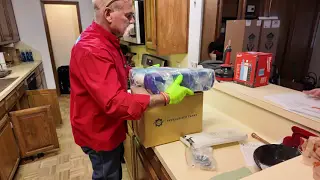Plumbing isn’t just about fixing leaks and unclogging drains—it’s a demanding, multifaceted career with considerable rewards and real challenges. If you’re trying to decide whether plumbing might be right for you, it’s vital to understand the realities of the job. From the physical toll on your body to the endless potential for growth, plumbers who succeed typically embody resilience, adaptability, and a strong willingness to learn. In this post, we’ll explore what makes plumbing both tough and rewarding, as well as how to position yourself for long-term success if you choose to enter the field.
Why Plumbing Is Hard on the Body
Plumbing is highly physical work. Much of a plumbing system lies behind walls, under floors, or underground, which often requires bending, kneeling, crawling, or digging for extended periods. Here are some of the main reasons why it can be demanding on the body:
- Heavy Lifting
- Carrying and installing water heaters, large pipes, and equipment can easily strain muscles.
- Repeated lifting over time can affect knees, shoulders, and the lower back if not done properly.
- Working in Constrained Spaces
- Plumbing systems often run through cramped crawl spaces and narrow trenches.
- Regularly twisting into awkward positions can lead to strains and potential long-term injuries if you don’t take the right precautions.
- Prolonged Standing and Walking
- Many service calls or new installations require long hours on your feet, sometimes on uneven terrain or ladders.
- Temperature Extremes
- In some regions, freezing conditions can force plumbers to work in icy environments to fix burst pipes; in warmer climates, attics or crawl spaces can be extremely hot.
Caring for Your Body
To mitigate these challenges, it’s essential to adopt good habits early:
- Regular Exercise: Strengthening your core and improving overall fitness can reduce the risk of injury.
- Proper Lifting Techniques: Bend at the knees rather than the waist and use lifting straps or a partner when necessary.
- Healthy Diet and Hydration: Maintaining a healthy weight and staying hydrated can help your joints and muscles handle physical strain.
Managing the Stress of Plumbing
Plumbing is not just physically challenging; it can also be mentally demanding. Plumbers juggle strict deadlines, unexpected emergencies, and high customer expectations. Here are some of the stressors you might encounter:
- Emergency Calls
- Burst pipes or major leaks often happen at inconvenient hours or during extreme weather.
- You may have to rush to multiple locations in a single day to handle urgent issues.
- Customer Interactions
- Walking into someone’s home or business means handling their concerns, budgets, and personalities.
- Keeping customers calm, explaining the situation, and delivering solutions can be stressful, especially under time pressure.
- Unpredictable Schedules
- Plumbing emergencies don’t follow a 9-to-5 clock. When there’s a crisis, plumbers are often the first people called.
- In busy seasons (e.g., during extreme cold snaps), you might work long days with little downtime.
- Tight Deadlines and Budgets
- On commercial projects, your work must align with other trades (electricians, HVAC technicians, etc.). Delays can impact the entire construction schedule.
- You might have to coordinate with inspectors, project managers, and general contractors, all of whom have their own schedules and expectations.
Strategies for Coping With Stress
- Time Management: Use scheduling tools or apps to plan out jobs, travel, and breaks.
- Communication Skills: Develop clear communication with customers and team members to avoid misunderstandings.
- Regular Breaks: Even a short pause to stretch or drink water can help clear your head.
- Continual Learning: When you’re confident in your technical knowledge, it’s easier to stay calm under pressure.
Plumbing’s Varied Fields
One of the great aspects of plumbing is the breadth of subfields you can specialize in. By understanding the different types of plumbing work, you can make informed decisions about where you want to build your career.
Residential Plumbing
- Description: Focuses on single-family homes, condos, and smaller multi-unit dwellings.
- Typical Work: Installing fixtures, repairing leaks, replacing water heaters, unclogging drains, and remodeling bathrooms and kitchens.
- Pros: Often involves smaller-scale projects with direct customer relationships.
- Cons: Work can fluctuate based on local housing markets and seasons.
Commercial Plumbing
- Description: Involves larger structures such as office buildings, retail spaces, and high-rises.
- Typical Work: Installing and maintaining complex drainage and water supply systems across multiple floors, ensuring code compliance in large public or corporate facilities.
- Pros: Potentially higher pay on large-scale projects; more structured environments.
- Cons: Projects often demand tight deadlines, coordination with many other trades, and compliance with stricter codes.
Industrial Plumbing
- Description: Centers on large-scale industrial settings like manufacturing plants, refineries, and facilities with specialized systems.
- Typical Work: Handling high-volume water supply, advanced piping systems for chemicals, steam lines, or waste management.
- Pros: Opportunities to learn cutting-edge or specialized plumbing techniques.
- Cons: Requires strict safety measures; the environment may be noisy, hot, or hazardous.
Service vs. New Construction
Regardless of the sector (residential, commercial, industrial), plumbing projects can be divided into service (repair and maintenance) or new construction (installing systems in new buildings):
- Service: Involves problem-solving, emergency responses, and interacting directly with the public.
- New Construction: Works from the ground up, often on teams with other trades, focusing on installing piping and fixtures before a building is completed.
Union vs. Non-Union Plumbing
When entering the plumbing industry, you can choose to pursue union or non-union paths:
- Union Plumbing
- Training and Apprenticeships: Union apprenticeships typically offer structured programs with classroom and on-the-job training.
- Higher Initial Wages: Union rates are often set by collective bargaining agreements.
- Job Placement: The union may connect you with contractors or projects.
- Cons: Work availability can fluctuate (especially in slow seasons). Some union shops may protect underperforming workers, causing tension among peers.
- Non-Union Plumbing
- Flexibility: Non-union plumbers can find jobs more freely across different companies.
- Wages: Pay can vary significantly depending on region, company size, and personal negotiation skills.
- Opportunity for Growth: There may be quicker upward mobility if you prove your skills, particularly in smaller companies.
- Cons: Fewer formal support systems, and you might have to find your own continuing education and certifications.
Both union and non-union have unique benefits and drawbacks. Having a clear career goal—like eventually starting your own company or moving into a specific niche—can help you decide which path best suits your ambitions.
The Role of Math in Plumbing
Math is a crucial element of plumbing. You don’t need to be a calculus expert, but certain calculations are unavoidable:
- Pipe Length and Fittings
- Estimating the correct lengths, angles, and sizes to ensure proper flow.
- Handling expansions, offsets, and fixture units for code compliance.
- Pressure and Flow Calculations
- Determining pipe diameters based on required water pressure and flow rates.
- Checking for potential drops in pressure over long runs or multiple fixtures.
- Project Estimations
- Accurately pricing out materials (like pipe, valves, fittings) and labor hours.
- Using math skills to create bids, schedule projects, and forecast completion times.
Overcoming Math Anxiety
If you haven’t always been comfortable with math, try learning it in a plumbing context. Tying equations directly to tasks—like calculating offsets for pipe or figuring slope for drainage—makes concepts more concrete. Hands-on practice also helps you recognize the real-world importance of the calculations you’re doing.
The Endless Possibilities and Future Outlook
The plumbing trade offers an array of career paths that extend well beyond standard repair work:
- Foreman or Superintendent
- Oversee teams on large commercial or industrial sites.
- Coordinate schedules, manage budgets, and ensure safety protocols.
- Business Owner
- Start and grow your own plumbing company, which can range from a small one-person shop to a multi-million-dollar enterprise.
- This path involves licensing, marketing, financial management, and hiring skilled employees.
- Consulting and Design
- Specialize in designing plumbing systems for architects, engineers, or property owners.
- Offer expertise in code requirements, fixture choices, and high-efficiency systems.
- Teaching and Training
- Work with trade schools, apprenticeship programs, or union training centers to pass on your knowledge.
- Contribute to shaping the next generation of plumbers.
Technology and Modern Innovations
As buildings become more advanced, so does the plumbing:
- Smart Fixtures: Faucets, toilets, and water heaters equipped with sensors and remote monitoring.
- Sustainable Systems: Greywater recycling, rainwater harvesting, and efficient irrigation systems are on the rise.
- Green Building Standards: Certifications like LEED often require advanced plumbing designs to reduce water usage and waste.
All of these areas create more opportunities for specialized expertise. If you’re enthusiastic about technology or environmental stewardship, plumbing offers a viable avenue to blend your skills and interests.
Income Potential in Plumbing
Many people considering plumbing are curious about the earning potential. While starting pay for apprentices may hover around 30,000to$40,00030,000 to \$40,000 per year (depending on location and market demand), wages often increase significantly with skill and experience. Here’s what you can expect:
- Apprentice to Journeyman
- After a few years (usually 2–5, depending on the program), you can test to become a journeyman. This status often brings a substantial pay bump.
- Journeyman to Master Plumber
- Master plumbers typically earn higher wages or run their own businesses. In many regions, master plumbers can pull permits, adding more responsibility and potential earnings.
- Beyond the Field
- Owners of successful plumbing companies might earn six or seven figures, particularly if they expand their businesses, diversify services, or operate across multiple cities.
- Highly skilled service plumbers can also reach $100,000to$300,000\$100,000 to \$300,000 per year in the right market, with high-end or specialized service offerings.
In short, plumbing can lead to a very comfortable lifestyle. The key is to keep learning, take advantage of growth opportunities, and maintain a positive reputation.
Tips for Getting Started
- Research Local Requirements
- Find out about the licensing process in your area. Each state or province has different rules regarding apprenticeships, exams, and hours required.
- Choose Your Sector
- Consider whether residential, commercial, industrial, or service work appeals to you. You can always try more than one sector to see what fits best.
- Seek Quality Mentorship
- Apprenticeships or training programs with reputable companies will accelerate your learning. Having the right mentor can drastically shape your skills and career trajectory.
- Stay Teachable
- Once you earn a license, don’t assume you know everything. Plumbing codes evolve, materials change, and technology advances. Constant learning ensures you remain at the top of the field.
- Develop Soft Skills
- Good communication, punctuality, and a professional attitude can set you apart. Customers value personable plumbers who can clearly explain issues and solutions.
Conclusion
The truth about plumbing is that it can be physically, mentally, and emotionally demanding. However, it’s also a profession filled with innovation, versatility, and high earning potential. Whether you’re drawn by the satisfaction of building something tangible, the thrill of solving urgent problems, or the prospect of owning your own thriving business one day, plumbing has a place for you.
By understanding the physical demands, stress factors, and variety of paths available—plus the critical role math and continual learning play—you’ll be in a position to make an informed choice about whether plumbing is the right fit. With hard work, the right training, and a commitment to growth, you can carve out a fulfilling and lucrative career in the plumbing industry, all while providing an essential service that keeps homes, businesses, and entire cities flowing smoothly.




